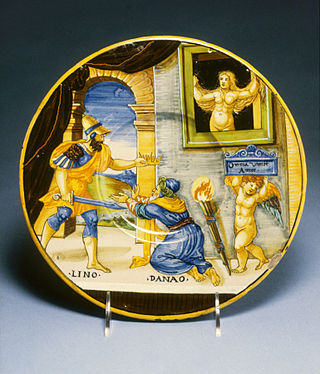Related Research Articles

In Greek mythology, Danaus was the king of Libya. His myth is a foundation legend of Argos, one of the foremost Mycenaean cities of the Peloponnesus. In Homer's Iliad, "Danaans" and "Argives" commonly designate the Greek forces opposed to the Trojans.

Hypermnestra, in Greek mythology, was a Libyan princess and, as one of the 50 Danaids, the daughters of King Danaus, son of King Belus of Egypt. Her mother was Elephantis. She was the full sister to Gorgophone.

In Greek mythology, Lynceus was a king of Argos, succeeding Danaus on the throne.
In Greek mythology, Busiris was the name shared by two figures:
In Greek mythology, Belus was a king of Egypt and father of Aegyptus and Danaus and (usually) brother to Agenor. The wife of Belus has been named as Achiroe or Side.

In Greek mythology, Nilus is one of the three thousand Potamoi, the river gods, who represent the god of the Nile river itself. Nilus is the son of the water gods Oceanus and Tethys.
In Greek mythology, Memphis was the female eponym of Memphis in Egypt. The name was attributed to several distinct characters, namely:
In Greek mythology, Phantes was an Egyptian prince as one of the sons of King Aegyptus.
Peristhenes, in Greek mythology, may refer to:
In Greek mythology, Potamon was an Egyptian prince as one of the sons of King Aegyptus.
In Greek mythology, Imbrus was an Egyptian prince as one of the sons of King Aegyptus.
Achiroë, Anchirrhoë (Ἀγχιρρόη), or Anchinoë (Ἀγχινόη), which is perhaps a mistake for Anchiroë, was in Greek mythology an Egyptian naiad, as daughter of the river-god Nilus. She was the wife of King Belus of Egypt, by whom she became the mother of Aegyptus and Danaus, and, according to some accounts, Cepheus, and Phineus.

In Greek mythology, the Danaïdes, also Danaides or Danaids, were the fifty daughters of Danaus, king of Libya. In the Metamorphoses, Ovid refers to them as the Belides after their grandfather Belus. They were to marry the 50 sons of Danaus' twin brother Aegyptus, a mythical king of Egypt. In the most common version of the myth, all but one of them killed their husbands on their wedding night and are condemned to spend eternity carrying water in a sieve or perforated device. In the classical tradition, they came to represent the futility of a repetitive task that can never be completed.
In Greek mythology, the Sons of Aegyptus were the fifty progeny of the king of Egypt, Aegyptus. They married their cousins, the fifty daughters of Danaus, twin brother of Aegyptus. In the most common version of the myth, they were all killed except one, Lynceus, who was saved by his wife Hypermnestra on their wedding night.
In Greek mythology, Aegyptus or Ægyptus may refer to the following related characters:
In Greek mythology, Elephantis was one of the multiple women of Danaus, king of Libya. She became the mother of two Danaides: Hypermnestra and Gorgophone. The latter married and murdered her husband Proteus during their wedding night while Hypermnestra spared the life of her spouse Lynceus. These couples then started a new line of the Argive dynasty and became the ancestors of Acrisius, Danae, Perseus, Heracles, etc.
In Greek mythology, Argyphia was one of the multiple consorts of Aegyptus, king of Egypt. She was a woman of royal blood and by the latter became the mother of six princes: Lynceus, Proteus, Busiris, Enceladus, Lycus and Daiphron. Her sons were married and murdered by their cousin-wives, daughters of King Danaus of Libya during their wedding night. The spared prince coupled with Hypermnestra and became the ancestors of famous Argives: Acrisius, Danae, Perseus, Heracles, etc.
In Greek mythology, Eurryroe was the daughter of the Egyptian river-god Nilus, thus she can be considered as a naiad.
In Greek mythology, Lixus was an Egyptian prince as one of the sons of King Aegyptus.
In Greek mythology, Isaia or Isaie was a Phoenician princess as the daughter of King Agenor of Tyre.
References
- Apollodorus, The Library with an English Translation by Sir James George Frazer, F.B.A., F.R.S. in 2 Volumes, Cambridge, MA, Harvard University Press; London, William Heinemann Ltd. 1921. ISBN 0-674-99135-4. Online version at the Perseus Digital Library. Greek text available from the same website.
- Fowler, Robert. L. (2000), Early Greek Mythography: Volume 1: Text and Introduction, Oxford University Press, 2000. ISBN 978-0198147404.
- Gantz, Timothy, Early Greek Myth: A Guide to Literary and Artistic Sources, Johns Hopkins University Press, 1996, Two volumes: ISBN 978-0-8018-5360-9 (Vol. 1), ISBN 978-0-8018-5362-3 (Vol. 2).
- Stewart, M. People, Places & Things: Aegyptus (1), Greek Mythology: From the Iliad to the Fall of the Last Tyrant.
- Vertemont, Jean, Dictionnaire des mythologies indo-europeenes, 1997.